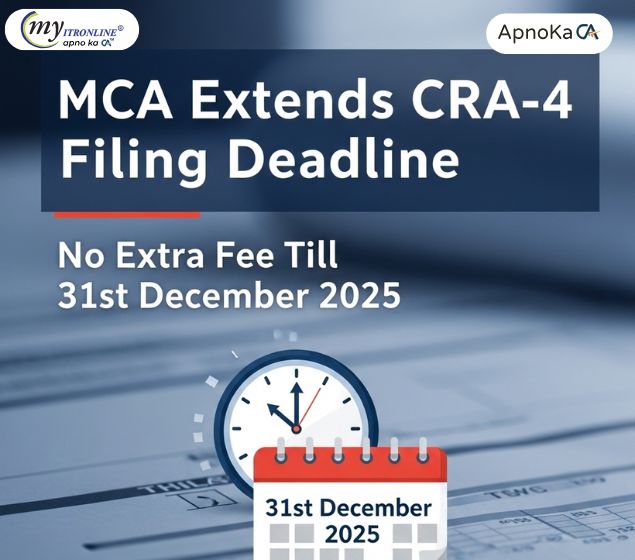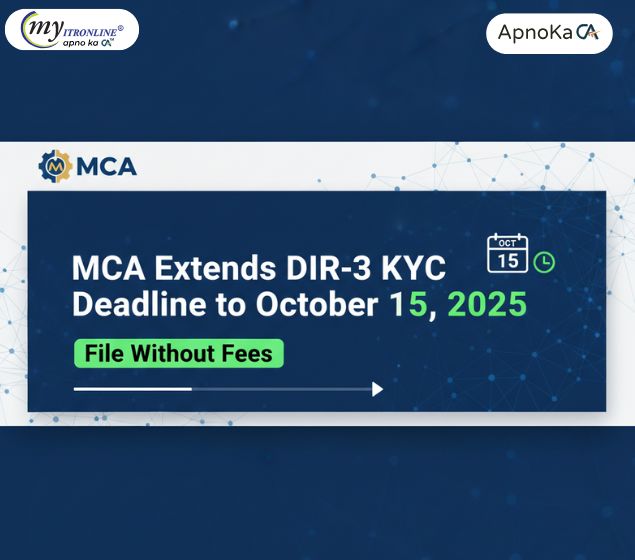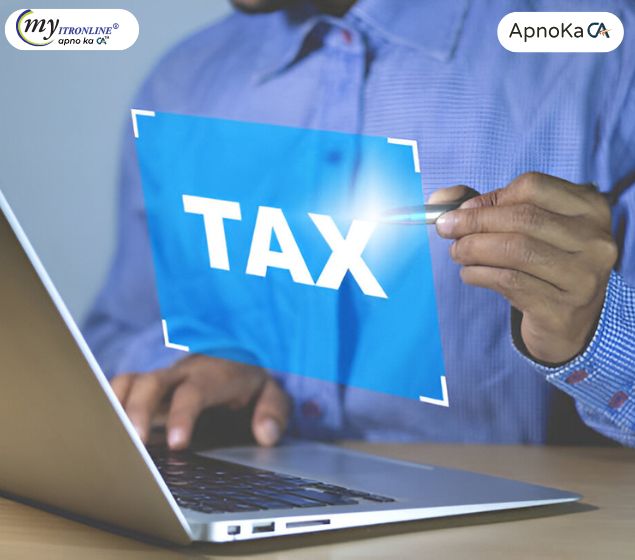# pan
12 posts in `pan` tag

MCA Extends CRA-4 Filing Deadline No Extra Fee Till 31st December 2025
The Ministry of Corporate Affairs (MCA) has extended the deadline for CRA-4 filing without extra fees till 31st December 2025. This move helps companies and cost auditors adjust to the new form rollout on the MCA V3 portal and avoid penalties.

DIR-3 KYC Deadline Extended to October 31, 2025 – No Late Fees
The Ministry of Corporate Affairs (MCA) has extended the DIR-3 KYC deadline to October 31, 2025. This allows directors to file without incurring the ₹5,000 late fee and avoid DIN deactivation. Learn who needs to file, which form to use, and why early action is crucial.

MCA Extends DIR-3 KYC Deadline to October 15, 2025 - File Without Fees
The Ministry of Corporate Affairs has extended the DIR-3 KYC filing deadline from September 30, 2025 to October 15, 2025, without any filing fees. This compliance requirement applies to all directors holding a DIN. Directors can file either DIR-3 KYC (with DSC) or DIR-3 KYC-WEB (OTP-based) forms. Non-compliance will result in DIN deactivation, penalties up to ₹5,000, and disqualification from director appointments. The extension follows stakeholder representations requesting additional time for compliance.

ITR-6 Excel Utility for AY 2025-26 is Live: What Corporate Filers Need to Know
This blog announces the release of the ITR-6 Excel Utility for the Assessment Year 2025-26 by the Income Tax Department. It details which companies are required to file this form, highlights key updates and changes for this year (such as LEI and capital gains reporting), provides a step-by-step guide on how to use the offline utility, and clarifies the important filing deadlines to help corporate filers ensure timely and accurate compliance.

PAN-Aadhaar Linking: CBDT Offers Major Relief on TDS Demand Notices (2025 Update)
In a major relief for Indian taxpayers, the Central Board of Direct Taxes (CBDT) has waived demands for short TDS deduction arising from payments to inoperative PAN holders. This addresses the widespread issue where deductors received tax notices for not applying the higher TDS rate mandated for unlinked PANs. This blog details the conditions of this relief as per CBDT Circular No. 9/2025, outlines the crucial deadlines like September 30, 2025, and explains the actionable steps for both deductors and deductees to benefit from this waiver and ensure future compliance.
.jpg)
Breaking Relief: CBDT Eases Higher TDS/TCS Burden for Inoperative PANs (Circular No. 9/2025)
This blog post explains the important relief offered by CBDT Circular No. 9/2025, dated July 22, 2025, about higher TDS/TCS rates for transactions with inoperative PANs. It describes how deductors and collectors will not be held responsible for short deductions or collections if the deductee's or collectee's PAN is made operative within certain time frames, specifically by September 30, 2025, for past transactions and within two months from the end of the month for future ones. The summary underscores the circular's importance in tackling taxpayer complaints, easing the compliance load, and encouraging PAN-Aadhaar linkage. It urges readers to grasp the new rules and take action quickly.
.jpg)
Taxpayer Alert! Decoding Income Tax Department's New Rules for FY 2025-26
The Income Tax Department is making significant updates and tightening compliance for FY 2025-26 (AY 2026-27). This blog post serves as an important "taxpayer alert." It explains key changes, such as the mandatory Aadhaar-based verification for updates to the e-filing portal and PAN applications. There is also a stronger emphasis on computer-assisted scrutiny (CASS) for certain types of returns, including survey/search cases, ITR-7 filers, recurring additions, and intelligence alerts. Additionally, it provides information on expected delays in ITR refunds due to outstanding demands and technical upgrades. The focus on HRA claims will tighten, especially those that involve family members. It highlights the need for proactive compliance, careful record-keeping, and timely responses to avoid penalties and ensure a smooth tax experience.

Income Tax E-Filing: Aadhaar OTP Verification Becomes Mandatory – Your Essential Guide
This blog post details the recent mandatory implementation of Aadhaar OTP verification on the Income Tax e-Filing portal for ITR verification and other services. It explains the reasons behind this shift, focusing on enhanced security, streamlined processes, and data integration. The post outlines the crucial impact on taxpayers, emphasizing the necessity of PAN-Aadhaar linking and updated mobile numbers. It also provides actionable steps for those not yet ready and reiterates the benefits of this digital transformation for tax administration in India.

Income Tax in India: Are You Prepared for July 2025?
This blog post provides a comprehensive overview of the significant income tax changes coming into effect in India from July 1, 2025. It details the more attractive new tax regime with revised slabs and increased deductions, the extended ITR filing deadline, the mandate for Aadhaar in PAN applications, and the real-time PAN-bank linking system. Furthermore, it touches upon the updated ITR forms and the broader proposals of the Income Tax Bill 2025, offering taxpayers crucial insights for compliance and effective tax planning.

Your PAN Application Just Got a Smart Upgrade: Hello Aadhaar OTP!
The Income Tax Department has made Aadhaar-based OTP verification mandatory for PAN registration on its e-filing portal. This crucial update aims to enhance security, prevent fraud, and streamline identity verification. The blog explains what this change means for applicants, the reasons behind the shift (like improved verification and faster PAN-Aadhaar integration), and the steps individuals need to take, emphasizing the importance of having an active mobile number linked to Aadhaar for a smooth application process.

Major Updates to AOC-4, MGT-7, and Other ROC Annual Filing Forms
This blog post details the significant updates to ROC Annual Filing forms, especially AOC-4 and MGT-7/7A, as part of the MCA V3 portal rollout effective July 14, 2025. It covers changes like integrated web forms, Excel-based data, pre-filled data, and revised submission processes, alongside crucial information on deadlines and penalties to help companies ensure timely and compliant submissions

Section 194C Explained: TDS on Contractor Payments & How to Report It in Your ITR
This blog post serves as a complete and detailed guide for businesses and individuals to understand Section 194C of the Income Tax Act, 1961. It explains TDS obligations on payments to contractors, outlines applicable rates and thresholds, and most importantly, teaches how to correctly report these deductions in your Income Tax Return (ITR). From verifying Form 26AS and AIS to avoiding mismatch notices, this article helps you ensure compliance, avoid scrutiny, and maintain a clean tax record.
